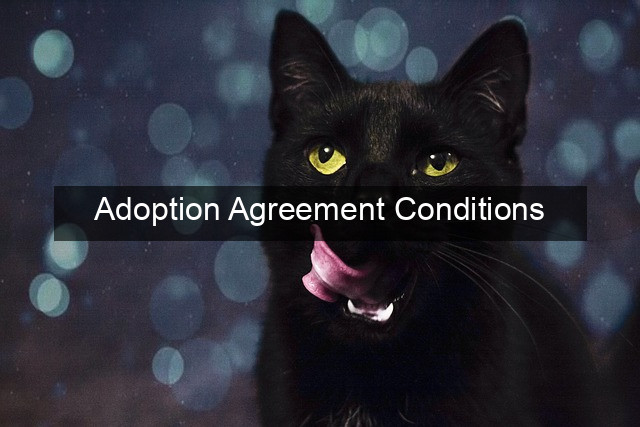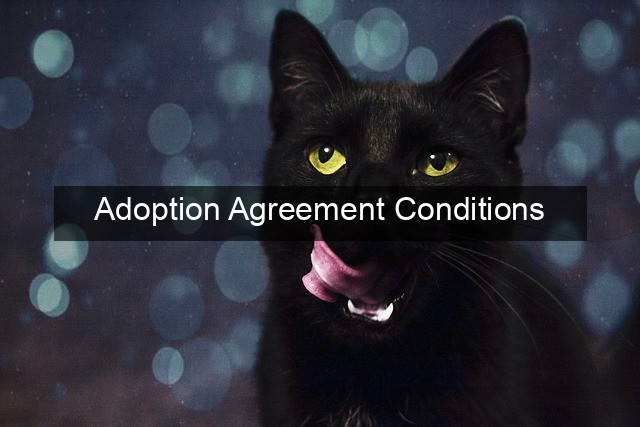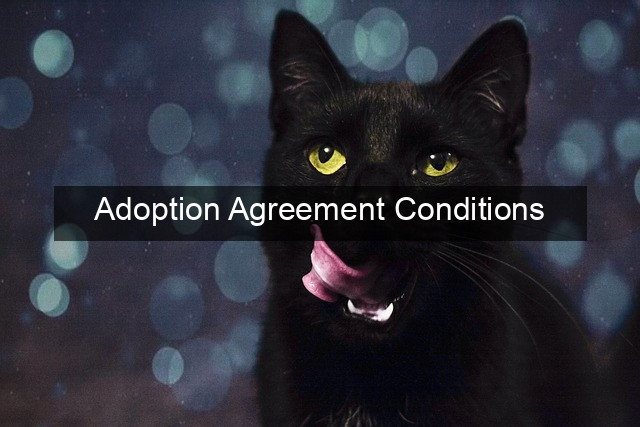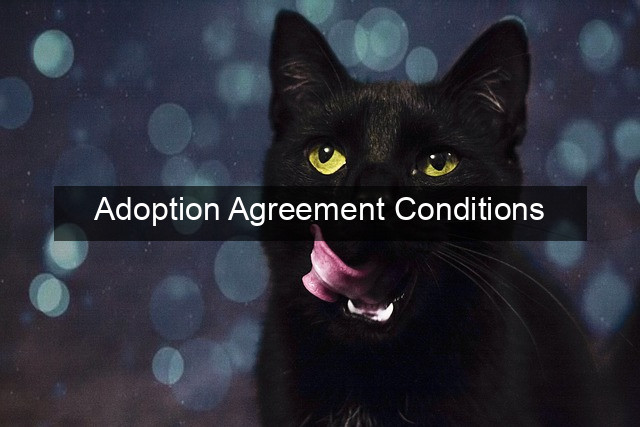Adoption Agreement Conditions

- Adoption Agreement Conditions
- Navigating the Complexities of Adoption Agreements
- Essential Elements of Adoption Agreements
- Consent and Relinquishment
- The Role of the Adoptive Parents
- Legal and Financial Considerations
- Post-Adoption Contact and Communication
- Open vs. Closed Adoptions
- Mediation and Support Services
- Conclusion
- Frequently Asked Questions

Navigating the Complexities of Adoption Agreements
Embarking on the journey of adoption is a profound and life-altering decision, filled with both joy and a significant amount of legal complexity. At the heart of this process lies the adoption agreement, a legally binding contract that outlines the rights and responsibilities of all parties involved. This comprehensive document serves as the foundation for the new parent-child relationship and dictates the terms of the adoption. Understanding the nuances of adoption agreements is crucial for both prospective adoptive parents and birth parents, ensuring a smooth and legally sound transition. This article delves into the key components of adoption agreements, exploring the various conditions, requirements, and legal considerations that shape this critical document. From the initial stages of consent to post-adoption contact arrangements, we will unravel the intricacies of adoption agreements, providing clarity and guidance for those navigating this emotional and legal landscape.
Essential Elements of Adoption Agreements
Consent and Relinquishment
The foundation of any adoption agreement rests on the principle of informed consent. Birth parents must voluntarily and knowingly relinquish their parental rights. This decision is typically irrevocable, meaning it cannot be reversed once finalized. The adoption agreement outlines the process for obtaining consent, ensuring it is free from coercion or undue influence. Legal safeguards are in place to protect the rights of birth parents and ensure they fully understand the implications of their decision.
The agreement specifies the timeframe within which birth parents can revoke their consent, if applicable. This period varies by jurisdiction but generally provides a window of opportunity for reconsideration. It is crucial for birth parents to have access to legal counsel during this process to fully understand their rights and options.
Furthermore, the agreement may address the issue of future contact between the birth parents and the child. This can range from closed adoptions with no contact to open adoptions with ongoing communication and visits. The specific terms are documented in the agreement, providing clarity and structure for all parties involved.
The Role of the Adoptive Parents
Prospective adoptive parents also play a crucial role in the adoption agreement. They are required to meet specific eligibility criteria, which vary depending on the jurisdiction and the adoption agency involved. These criteria often include background checks, home studies, and financial stability assessments.
The agreement outlines the responsibilities of the adoptive parents, including their commitment to providing a safe, stable, and nurturing environment for the child. It also addresses legal and financial obligations, such as assuming legal guardianship and providing for the child’s well-being.
Adoptive parents must demonstrate their understanding of the adoption process and their commitment to fulfilling the lifelong responsibilities of parenthood. The agreement serves as a formal acknowledgment of these responsibilities, ensuring the child’s best interests are protected.
Legal and Financial Considerations
Adoption agreements address various legal and financial aspects of the adoption process. These include the payment of legal fees, court costs, and any other expenses associated with the adoption. The agreement clearly outlines who is responsible for these costs, ensuring transparency and avoiding disputes.
The agreement also addresses the issue of birth certificates and the legal recognition of the adoptive parents as the child’s parents. This ensures the child’s legal status is secure and that they have access to the same rights and privileges as any other child.
Furthermore, the agreement may address issues related to inheritance and the child’s future rights. This is particularly important in cases involving trusts or estates, ensuring the adopted child is included in any inheritance provisions.
Post-Adoption Contact and Communication
Open vs. Closed Adoptions
Adoption agreements often address the sensitive issue of post-adoption contact between the birth parents and the adoptive family. The level of contact can vary significantly, ranging from closed adoptions with no contact to open adoptions with ongoing communication and visits.

The specific terms of post-adoption contact are outlined in the agreement, providing a framework for all parties involved. This can include details about the frequency and nature of contact, such as letters, phone calls, emails, or in-person visits.

It’s important to note that the level of openness in an adoption can evolve over time, depending on the needs and wishes of all parties. The agreement may include provisions for modifying the contact arrangements as the child grows and circumstances change.
Mediation and Support Services
Adoption agreements may also include provisions for mediation and support services. These services can be invaluable in helping families navigate the complexities of post-adoption relationships and address any challenges that may arise.
Mediation can provide a neutral platform for communication and conflict resolution, helping birth parents and adoptive families maintain healthy relationships. Support groups and counseling services can also provide emotional support and guidance during this transition.
These resources can be particularly helpful in open adoptions, where ongoing communication and interaction require careful navigation. By including provisions for mediation and support services, the adoption agreement can foster positive and enduring relationships between all parties.
Conclusion
Adoption agreements are complex legal documents that play a pivotal role in the adoption process. Understanding the key components of these agreements is essential for both prospective adoptive parents and birth parents. By carefully considering the various conditions, requirements, and legal considerations outlined in the agreement, all parties can ensure a smooth and legally sound transition. A well-drafted adoption agreement provides clarity, structure, and protection for everyone involved, ultimately creating a foundation for a loving and successful adoption journey. Remember, seeking legal counsel is crucial throughout this process to ensure your rights are protected and your best interests are served. The complexities of adoption law necessitate professional guidance, and seeking expert advice is a vital step in navigating this life-changing process.
Frequently Asked Questions
What is the purpose of an adoption agreement?
An adoption agreement is a legally binding contract that outlines the rights and responsibilities of all parties involved in an adoption. It formalizes the transfer of parental rights and establishes the new parent-child relationship.
Can a birth parent change their mind after signing an adoption agreement?
The ability of a birth parent to revoke their consent after signing an adoption agreement varies by jurisdiction. There is usually a specific timeframe within which revocation is possible, after which the decision is generally irreversible.
What are the different types of adoption agreements?
Adoption agreements can vary in terms of post-adoption contact arrangements. They can range from closed adoptions with no contact to open adoptions with ongoing communication and visits.
What are the eligibility requirements for adoptive parents?
Eligibility requirements for adoptive parents vary depending on the jurisdiction and the adoption agency involved. These often include background checks, home studies, and financial stability assessments.
Who pays for the legal fees and expenses associated with adoption?
The adoption agreement outlines who is responsible for the legal fees, court costs, and other expenses associated with the adoption. This ensures transparency and avoids disputes.

| Adoption Type | Contact Level |
|---|---|
| Closed Adoption | No contact between birth parents and adoptive family |
| Semi-Open Adoption | Limited contact, often mediated through the adoption agency |
| Open Adoption | Ongoing communication and visits between birth parents and adoptive family |
- Consult with an adoption attorney.
- Thoroughly review the adoption agreement.
- Understand your rights and responsibilities.
- Consider the long-term implications of your decisions.




